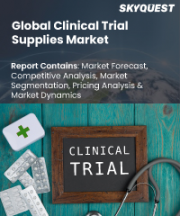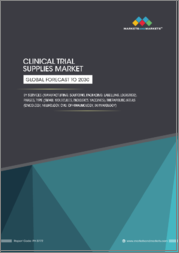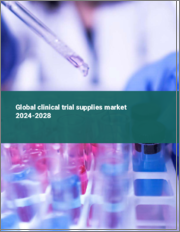
|
시장보고서
상품코드
1498370
임상시험 용품 시장 평가 : 서비스 유형별, 유형별, 치료 영역별, 상별, 최종사용자별, 지역별, 기회, 예측(2017-2031년)Clinical Trial Supplies Market Assessment, By Service Type, By Type, By Therapeutic Area, By Phase, By End-user, By Region, Opportunities and Forecast, 2017-2031F |
||||||
세계 임상시험 용품 시장 규모는 2024-2031년 예측 기간 동안 7.97%의 CAGR로 2023년 30억 1,000만 달러에서 2031년 55억 6,000만 달러로 확대될 것으로 예상됩니다. 이 시장은 최근 몇 년 동안 괄목할 만한 성장세를 보였으며, 앞으로도 견조한 성장세를 유지할 것으로 예상됩니다.
임상시험은 의약품 개발에서 필수적인 단계이며, 개발자는 이를 통해 의약품의 안전성과 유효성을 확인합니다. 이 단계는 공공의 안전을 보장하기 위해 모든 의약품과 화학제품이 출시되기 전에 의무적으로 수행해야 합니다. 기술 발전, 인구 증가, 만성 질환의 증가, 임상시험의 필요성 증가, 의약품 및 화학제품에 대한 수요 증가, 환자 안전을 보장하기 위한 규제 요건 증가 등의 요인으로 인해 시장이 크게 성장하고 있습니다. 또한, 이 업계는 연구 및 개발에 도움이 되는 정확하고 빠른 결과를 제공하는 스마트 기기의 출시를 목격하고 있습니다. 기업과 실무자들은 업계 전문가들에게 최고의 기술을 제공하기 위해 협력하고 있습니다. 공공 기관과 영리 단체 모두 양질의 솔루션을 제공하기 위해 자금을 조달하고 많은 투자를 하고 있습니다. 이러한 거대 기업들은 제휴, 투자, 인수합병(M&A)과 같은 전략적 전략을 통해 신제품을 개발하고 도입하는 데 주력하고 있습니다.
이 보고서는 세계 임상시험 용품 시장을 조사하여 시장 개요와 함께 서비스 유형별, 유형별, 치료 영역별, 상별, 최종사용자별, 지역별 동향, 시장 진입 기업 개요 등을 제공합니다.
목차
제1장 조사 방법
제2장 프로젝트 범위와 정의
제3장 주요 요약
제4장 세계의 임상시험 용품 시장 전망, 2017-2031년
- 시장 규모와 예측
- 서비스 유형별
- 유형별
- 치료 분야별
- 상별
- 최종사용자별
- 지역별
- 기업별 시장 점유율(%), 2023년
제5장 세계의 임상시험 용품 시장 전망, 지역별, 2017-2031년
- 북미
- 유럽
- 아시아태평양
- 남미
- 중동 및 아프리카
제6장 시장 매핑, 2023년
제7장 거시적 환경과 산업 구조
- 수요 공급 분석
- 수출입 분석
- 밸류체인 분석
- PESTEL 분석
- Porter's Five Forces 분석
제8장 시장 역학
제9장 혁신/신기술
제10장 주요 진출 기업 상황
제11장 사례 연구
제12장 주요 진출 기업 전망
- Thermo Fisher Scientific Inc.
- Catalent Inc.
- Eurofins Scientific
- Marken
- Parexel
- ICON plc
- Almac Group Limited
- Biocair International Limited
- Sharp Services, LLC
- Syneos Health
제13장 전략적 제안
제14장 문의와 면책사항
ksm 24.06.26Global clinical trial supplies market is projected to witness a CAGR of 7.97% during the forecast period 2024-2031, growing from USD 3.01 billion in 2023 to USD 5.56 billion in 2031. The market has experienced significant growth in recent years and is expected to maintain a strong pace of expansion in the coming years.
Clinical trial is an essential step in developing any drug through which the developers ensure the safety and efficacy of any drug. This step is mandatory for any drug or chemical product before its launch to ensure public safety. The market is growing manifold due to factors such as advancing technology, increasing population and cases of chronic diseases, increasing need for clinical trials, increasing demand for drugs and chemical products and the rising regulatory requirements to ensure patient safety. Additionally, the industry has seen the launch of smart devices that provide precise and quick findings that are helpful in research and development. Companies and practitioners are collaborating to provide the best technology for industry professionals. Both public and commercial organizations are raising money and investing a sizable sum of it to be able to provide quality solutions. These massive corporations use strategic maneuvers like collaborations, investments, and mergers and acquisitions when they are striving to develop or introduce a new product. For instance, a strategic partnership between ICON plc (Ireland) and LEO Pharma (Denmark) was formed in March 2023 to improve LEO Pharma's clinical trial operations, emphasizing cost-effectiveness and patient-centricity.
Thermo Fisher Scientific Inc. (US) and the National Minority Quality Forum (NMQF), an independent non-profit organization devoted to research and education, partnered in September 2023. The goal of this partnership, which is made possible by NMQF's Alliance for Representative Clinical Trials (ARC), is to increase the participation of patient groups who have historically been underrepresented in clinical research.
Growing Need for Clinical Trials Fuels Market Growth
Clinical trials are essential for expanding our understanding of medicine, assessing novel cures, and enhancing patient care. The expanding number of registered trials reflects the increased interest in medical research, the creation of novel treatments, and the understanding of the significance of evidence-based medicine. According to the United States National Library of Medicine, there are 452,604 studies registered on Clinicaltrials.gov, with locations in all 50 states and 221 countries worldwide. The quick development of medical research and technology is one of the main causes of the rise in registered clinical trials. New research directions have been made possible by identifying novel disease targets, advancements in the knowledge of molecular mechanisms, and developments in fields such as immunology, regenerative medicine, and genomics. As a result, there has been a significant increase in the creation of innovative treatments and interventions, increasing the demand for clinical studies to assess their efficacy and safety.
Furthermore, the public, researchers, and healthcare professionals are becoming more aware of the value of evidence-based medicine.
A methodical and thorough way to assess the effectiveness and safety of medical therapies is through clinical trials. More academics and organizations are conducting clinical trials in response to the growing need for evidence-based medicine to produce high-quality data that can inform medical decisions and enhance patient outcomes. Moreover, the rise of registered trials can also be attributed to the globalization of clinical research. Clinical trials used to be mostly carried out in industrialized nations. Nonetheless, there has been a notable change in the direction of conducting trials in other geographical areas, such as developing and emerging markets. As of May 17, 2023, clinicaltrials.gov reports 140,268 registered studies overall. However, there have been about 240,844 registered studies in countries apart from the United States. Numerous variables are driving this increase, including easier access to larger patient populations, a wider range of genetic origins, lower prices, and quicker regulatory pathways. Consequently, many clinical trials have been filed in areas previously underrepresented in medical research, driving market growth.
Rising Regulatory Requirements to Ensure Patient Safety
The market for clinical trials is expanding due to the need for safety evaluations of novel drugs and compounds. Strict regulatory requirements requiring thorough toxicity studies serve as the driving force for these assessments. Modern technological developments like organ-on-a-chip models and high-throughput screening have eliminated the practice of animal research. It has been demonstrated that these novel models improve the accuracy and relevance of the predictions in the tests. Furthermore, because of the increased safety concerns surrounding high-profile medication withdrawals, thorough safety assessments have become increasingly necessary throughout the drug development process. In addition to saving money and time, in-vitro testing contributes to the healthy expansion of the biotechnology and pharmaceutical industries by enabling the creation of safer and more effective therapeutic agents to meet the growing incidence of chronic diseases and aging populations.
For example, Parexel International Corp, a global clinical research organization (CRO) that focuses on the discovery and delivery of innovative new therapies to enhance patient health, announced the development of a new clinical trial supply and logistics depot in Suzhou, China, in September 2022. This well-placed facility provides quick access to supplies and investigational therapeutics for delivery to clinical locations and patients worldwide for domestic and foreign biopharmaceutical companies conducting clinical studies.
Thermo Fisher Scientific Inc. stated in October 2022 that it will increase operations in Kentucky to assist clients by providing patients with life-altering medications. The current facility offers biomarker and central lab services, giving biopharma customers access to top-notch lab work to expedite the drug development. Additionally, this has increased the company's global visibility and allowed it to grow its diagnostics business throughout the globe.
Growth in Demand for Biologics to Fuel Market Growth
Biologics and biosimilars are manufactured using extremely intricate procedures from living cells, and their market share is predicted to increase steadily because of growing research into biotechnology and genetics, including the development of biosimilar products and nanoparticle-based drug delivery systems. Biologics, which include hormones, blood products, vaccines, genes, insulin, and monoclonal antibody (mAb) products, are being used as the most cutting-edge treatments for autoimmune illnesses such as rheumatoid arthritis and Crohn's disease. Over the projected time, biologics have grown significantly due to their growing demand and clinical benefits. For instance, five biosimilars were approved by the Center for Drug Evaluation and Research (CDER) in 2023, three of which were biosimilars for reference products for which there was no prior biosimilar. For 14 reference products, CDER has authorized 45 biosimilars so far. Several products were authorized as interchangeable biosimilars, which can be interchanged for the reference product at a pharmacy, like generics that are substituted subject to state law. CDER has approved seven interchangeable biosimilars.
The number of cancer cases is rising quickly, and researchers are becoming more innovative in their approaches to using biologics for treating cancer. In an article published in January 2022 by the American Cancer Society Journal, the number of cancer cases reported has gone up to approximately 1.9 million in the United States in 2022. Biologics therapy is becoming more popular than standard cancer treatment because it uses the body's natural immune systems and healing capabilities to either combat cancer or repair healthy tissue following treatment. Therefore, more cancer cases fuel biologics expansion, so the biologics segment is predicted to expand significantly.
North America to Dominate the Clinical Trial Supplies Market
The increasing number of clinical trials is why North America has the largest global market for clinical trial supplies. The North American clinical trial supply industry is driven by rising government funding, increasing disease prevalence, and a growing number of clinical trials. Since more large-scale pharmaceutical R&D clinical trials are carried out in this region, many CROs and biopharmaceutical businesses have established their headquarters in the United States and Canada. The most efficient regulation of clinical trials with advanced therapy, including electronic records and signatures, protection of human subjects, and good clinical practices for non-clinical laboratory studies, eases the process of conducting clinical trials overall. Significant R&D investments are being made due to high cancer prevalence in the United States, another factor propelling North America's clinical trial supply market.
According to the cancer facts and figures report for 2023 from the American Cancer Society, approximately 1.9 million new cancer cases were diagnosed in 2023. Notably, prostate cancer is projected to lead with an estimated 288,300 cases, followed by lung cancer with 238,340 cases, and female breast cancer with 300,590 cases. Similarly, data released by the Government of Canada in May 2022 revealed that around 233,900 Canadians received cancer diagnoses in 2022, with prostate cancer anticipated to remain the most commonly diagnosed type of cancer. The market for clinical trial supplies in North America is therefore being driven by the rising number of cancer cases that are recorded each year. Therefore, for the reasons outlined above, the North American clinical trial supplies market is the largest and is anticipated to develop significantly throughout the projected period. In August 2022, Marken Ltd. (US) purchased Bomi Group to support the expansion of healthcare logistics by expanding the company's international presence and strengthening cold chain capabilities in important European and Latin American markets.
Future Market Scenario (2024-2031F)
One of the main factors contributing to the anticipated growth of the clinical trial supplies market is the increasing demand for clinical trial services to ensure patient safety by delivering the right quality of drugs. The rising population and increasing cases of chronic diseases such as cardiovascular diseases, diabetes, and cancer will also propel the market growth in the forecast period. Players in this market are expanding at an unparalleled rate, introducing cost-effective and efficient technologies. For instance, the IXRS 3 Partnership Network was unveiled by Almac Group Limited (UK) in April 2023 to accelerate developing and implementing cutting-edge eClinical solutions for biopharmaceutical sponsors.
Key Players Landscape and Outlook
Several companies such as Thermo Fisher Scientific Inc., Catalent Inc., Eurofins Scientific, Marken, Parexel, ICON plc, Almac Group Limited, Biocair International Limited, Sharp Services, LLC, Syneos Health, etc., are expanding business by planning and adopting new strategies. They are complying with new strategic initiatives regarding the launches of newly developed clinical trial supplies to help researchers and bring up their market presence. New product launches, agreements based on contracts, acquisitions and mergers, investments, and partnerships are a few ways through which they are trying to achieve the same.
Thermo Fisher Scientific Inc.'s PPD (Pharmaceutical Product Development) clinical research division and Matrix Clinical Trials, a Matrix Medical Network service, joined forces in April 2022 to provide patients with clinical trials through a cutting-edge decentralized clinical trial (DCT) solution.
ASLAN Pharmaceuticals and Thermo Fisher Scientific Inc. partnered in January 2023 to produce an Eblasakimab formulation at a high concentration for future research. Thermo Fisher Scientific will supervise a clinical supply of Eblasakimab for the planned Phase 3 trials by providing its biologic manufacturing knowledge and scale-up capability.
Table of Contents
1. Research Methodology
2. Project Scope & Definitions
3. Executive Summary
4. Global Clinical Trial Supplies Market Outlook, 2017-2031F
- 4.1. Market Size & Forecast
- 4.1.1. By Value
- 4.2. By Service Type
- 4.2.1. Logistics and Distribution
- 4.2.2. Storage and Retention
- 4.2.3. Packaging and Labelling
- 4.2.4. Manufacturing
- 4.2.5. Comparator Sourcing
- 4.2.6. Others
- 4.3. By Type
- 4.3.1. Small-Molecule Drugs
- 4.3.2. Biologic Drugs
- 4.3.3. Medical Devices
- 4.4. By Therapeutic Area
- 4.4.1. Oncology
- 4.4.2. Neurology
- 4.4.3. Infectious Diseases
- 4.4.4. Metabolic Disorders
- 4.4.5. Immunology
- 4.4.6. Cardiology
- 4.4.7. Genetic and Rare Diseases
- 4.4.8. Others
- 4.5. By Phase
- 4.5.1. Phase I
- 4.5.2. Phase II
- 4.5.3. Phase III
- 4.5.4. Phase IV
- 4.6. By End-user
- 4.6.1. Pharmaceutical Companies
- 4.6.2. Biotechnology Companies
- 4.6.3. Medical Devices Companies
- 4.6.4. Research Contract Companies
- 4.7. By Region
- 4.7.1. North America
- 4.7.2. Europe
- 4.7.3. Asia-Pacific
- 4.7.4. South America
- 4.7.5. Middle East and Africa
- 4.8. By Company Market Share (%), 2023
5. Global Clinical Trial Supplies Market Outlook, By Region, 2017-2031F
- 5.1. North America*
- 5.1.1. Market Size & Forecast
- 5.1.1.1. By Value
- 5.1.2. By Product/Service Type
- 5.1.2.1. Logistics and Distribution
- 5.1.2.2. Storage and Retention
- 5.1.2.3. Packaging and Labelling
- 5.1.2.4. Manufacturing
- 5.1.2.5. Comparator Sourcing
- 5.1.2.6. Others
- 5.1.3. By Type
- 5.1.3.1. Small-Molecule Drugs
- 5.1.3.2. Biologic Drugs
- 5.1.3.3. Medical Devices
- 5.1.4. By Therapeutic Area
- 5.1.4.1. Oncology
- 5.1.4.2. Neurology
- 5.1.4.3. Infectious Diseases
- 5.1.4.4. Metabolic Disorders
- 5.1.4.5. Immunology
- 5.1.4.6. Cardiology
- 5.1.4.7. Genetic and Rare Diseases
- 5.1.4.8. Others
- 5.1.5. By Phase
- 5.1.5.1. Phase I
- 5.1.5.2. Phase II
- 5.1.5.3. Phase III
- 5.1.5.4. Phase IV
- 5.1.6. By End-user
- 5.1.6.1. Pharmaceutical Companies
- 5.1.6.2. Biotechnology Companies
- 5.1.6.3. Medical Devices Companies
- 5.1.6.4. Research Contract Companies
- 5.1.7. United States*
- 5.1.7.1. Market Size & Forecast
- 5.1.7.1.1. By Value
- 5.1.7.2. By Product/Service Type
- 5.1.7.2.1. Logistics and Distribution
- 5.1.7.2.2. Storage and Retention
- 5.1.7.2.3. Packaging and Labelling
- 5.1.7.2.4. Manufacturing
- 5.1.7.2.5. Comparator Sourcing
- 5.1.7.2.6. Others
- 5.1.7.3. By Type
- 5.1.7.3.1. Small-Molecule Drugs
- 5.1.7.3.2. Biologic Drugs
- 5.1.7.3.3. Medical Devices
- 5.1.7.4. By Therapeutic Area
- 5.1.7.4.1. Oncology
- 5.1.7.4.2. Neurology
- 5.1.7.4.3. Infectious Diseases
- 5.1.7.4.4. Metabolic Disorders
- 5.1.7.4.5. Immunology
- 5.1.7.4.6. Cardiology
- 5.1.7.4.7. Genetic and Rare Diseases
- 5.1.7.4.8. Others
- 5.1.7.5. By Phase
- 5.1.7.5.1. Phase I
- 5.1.7.5.2. Phase II
- 5.1.7.5.3. Phase III
- 5.1.7.5.4. Phase IV
- 5.1.7.6. By End-user
- 5.1.7.6.1. Pharmaceutical Companies
- 5.1.7.6.2. Biotechnology Companies
- 5.1.7.6.3. Medical Devices Companies
- 5.1.7.6.4. Research Contract Companies
- 5.1.7.1. Market Size & Forecast
- 5.1.8. Canada
- 5.1.9. Mexico
- 5.1.1. Market Size & Forecast
All segments will be provided for all regions and countries covered
- 5.2. Europe
- 5.2.1. Germany
- 5.2.2. France
- 5.2.3. Italy
- 5.2.4. United Kingdom
- 5.2.5. Russia
- 5.2.6. Netherlands
- 5.2.7. Spain
- 5.2.8. Turkey
- 5.2.9. Poland
- 5.3. Asia-Pacific
- 5.3.1. India
- 5.3.2. China
- 5.3.3. Japan
- 5.3.4. Australia
- 5.3.5. Vietnam
- 5.3.6. South Korea
- 5.3.7. Indonesia
- 5.3.8. Philippines
- 5.4. South America
- 5.4.1. Brazil
- 5.4.2. Argentina
- 5.5. Middle East & Africa
- 5.5.1. Saudi Arabia
- 5.5.2. UAE
- 5.5.3. South Africa
6. Market Mapping, 2023
- 6.1. By Service Type
- 6.2. By Type
- 6.3. By Therapeutic Area
- 6.4. By Phase
- 6.5. By End-user
- 6.6. By Region
7. Macro Environment and Industry Structure
- 7.1. Demand Supply Analysis
- 7.2. Import Export Analysis
- 7.3. Value Chain Analysis
- 7.4. PESTEL Analysis
- 7.4.1. Political Factors
- 7.4.2. Economic System
- 7.4.3. Social Implications
- 7.4.4. Technological Advancements
- 7.4.5. Environmental Impacts
- 7.4.6. Legal Compliances and Regulatory Policies (Statutory Bodies Included)
- 7.5. Porter's Five Forces Analysis
- 7.5.1. Supplier Power
- 7.5.2. Buyer Power
- 7.5.3. Substitution Threat
- 7.5.4. Threat from New Entrant
- 7.5.5. Competitive Rivalry
8. Market Dynamics
- 8.1. Growth Drivers
- 8.2. Growth Inhibitors (Challenges and Restraints)
9. Innovations/Emerging Technologies
10. Key Players Landscape
- 10.1. Competition Matrix of Top Five Market Leaders
- 10.2. Market Revenue Analysis of Top Five Market Leaders (in %, 2023)
- 10.3. Mergers and Acquisitions/Joint Ventures (If Applicable)
- 10.4. SWOT Analysis (For Five Market Players)
- 10.5. Patent Analysis (If Applicable)
11. Case Studies
12. Key Players Outlook
- 12.1. Thermo Fisher Scientific Inc.
- 12.1.1. Company Details
- 12.1.2. Key Management Personnel
- 12.1.3. Products & Services
- 12.1.4. Financials (As reported)
- 12.1.5. Key Market Focus & Geographical Presence
- 12.1.6. Recent Developments
- 12.2. Catalent Inc.
- 12.3. Eurofins Scientific
- 12.4. Marken
- 12.5. Parexel
- 12.6. ICON plc
- 12.7. Almac Group Limited
- 12.8. Biocair International Limited
- 12.9. Sharp Services, LLC
- 12.10. Syneos Health
Companies mentioned above DO NOT hold any order as per market share and can be changed as per information available during research work.



















